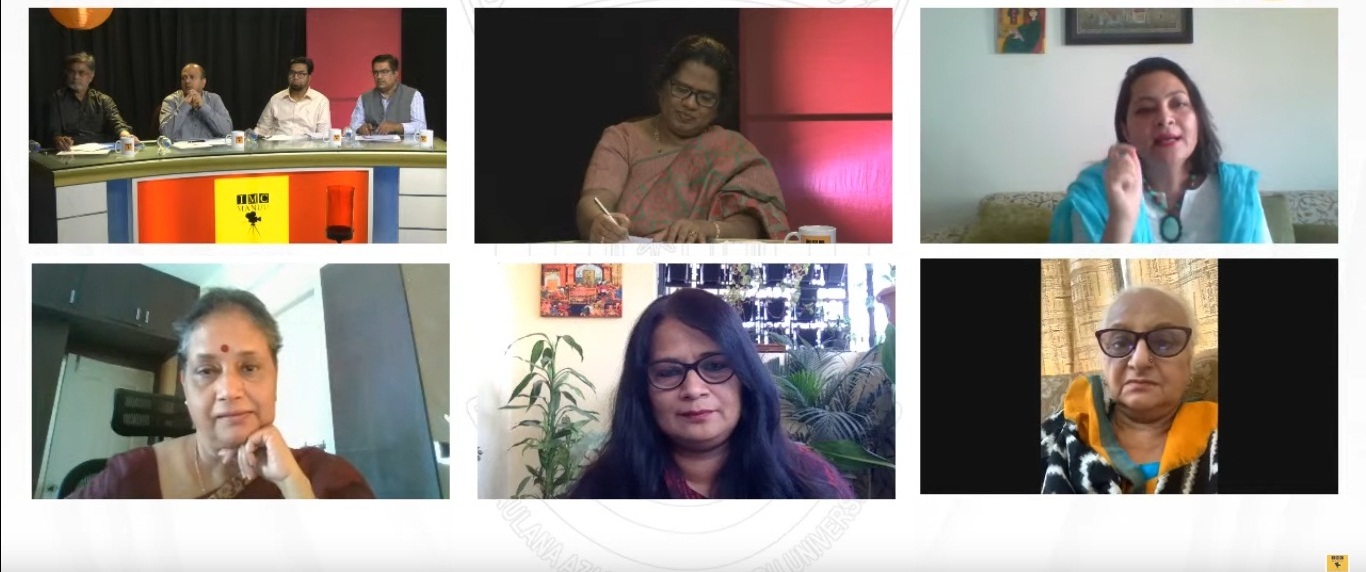Eminent journalists rue lack of women representation in Indian media

Well-known journalists Arfa Khanum, Chief Editor, The Wire, Amer Ali Khan, News Editor, Siasat, Fazil Hussain Parvez, Chief Editor Gawah, Farhat Rizvi, Senior Journalist, Rashtriya Sahara, Ayesha Khanum, Doordarshan, Bengaluru participated in the round table of Media leaders on “Gender Reporting in Urdu Media - Opportunities & Challenges,” organized by MANUU.
TCN News
Hyderabad: “The representation of women journalists in media houses is lacking along with the coverage of the women issues and both needed to be improved.” These views were expressed on Wednesday by eminent journalists in a webinar organized by the Centre for Women’s Studies and Department of Journalism and Mass Communication, Maulana Azad National Urdu University (MANUU) in collaboration with Population First supported by UNFPA and the Norwegian Embassy.
“Women activism in leading various peaceful protests is a sign of healthy democracy,” they said.
Well-known journalists Arfa Khanum, Chief Editor, The Wire, Amer Ali Khan, News Editor, Siasat, Fazil Hussain Parvez, Chief Editor Gawah, Farhat Rizvi, Senior Journalist, Rashtriya Sahara, Ayesha Khanum, Doordarshan, Bengaluru participated in the round table of Media leaders on “Gender Reporting in Urdu Media - Opportunities & Challenges.”
Prof. Siddiqui Mohd. Mahmood, Registrar I/c presided over the round table.
Arfa Khanam said that “women at the front lines of protests are like a ray of hope in the darkness.”
“The market demands the presence of women on the screen. Everyone talks about empowering women, but the important thing is that how do the women exercise their empowerment,” she said.
Amer Ali Khan described social media as a new field for women to express their views. “The number of Muslim women is relatively low in Media including Urdu Media because it is difficult for them to maintain a balance between the professional requirements and domestics compulsions,” he said.
Khan said that “Muslim women, although educated, find it difficult to take up jobs, especially after marriage.”
He spoke about the efforts by Siasat Urdu daily in the economic upliftment of minorities especially women.
Fazil Hussain Parvez spoke about the history of Urdu journalism and said that Indian media diminished the status of women in the name of development. He referred to the women who have published and are also the editors of the magazines.
Farhat Rizvi while talking about the difficulties faced by women journalists suggested that the NGOs, Urdu newspapers and MANUU’s Center for Women Studies can bring some concrete results by conducting seminars on Women Empowerment.
Ayesha Khanum said that there is a need to increase gender sensitivity in Urdu journalism. “Women’s news are given less space in Urdu media but now things are changing,” he said.
Prof. Siddiqui Mohd. Mahmood, Registrar I/c in his presidential remarks said democracy allows differences in opinion. “The media should become the voice of the voiceless. We need to educate people so that they can understand the news and can analyze it realistically. Not only women but also the oppressed classes should be empowered through education,” he added.
Earlier, Prof. Shahida Murtaza, Director, CWS delivered the welcome address.
She said there was less material available about women in the media and their representation also needed attention.
Dr. AL Sharda, Director of Population First introduced the guests. Prof. Ehtesham Ahmad Khan, Dean, School of Mass Communication and Journalism was the Moderator. Prof. Mohd. Fariyad, Head, Department of MCJ convened the programme.
Meanwhile, Prof. SM Rahmatullah, Vice-Chancellor I/c will preside over the panel discussion scheduled to be held online on March 25, from 11 am to 2 pm. The panellists include Qurban Ali, Seema Mustafa, Rasheda Hussain and Mohammad Azam Shahid.
The programme will be webcast live on IMC, MANUU Youtube channel.
